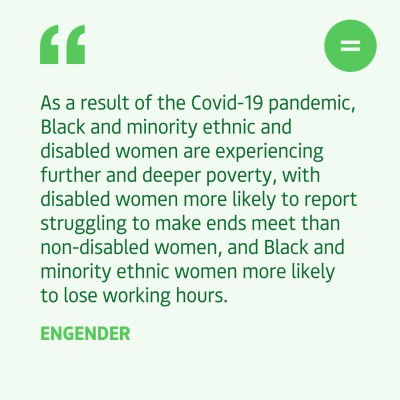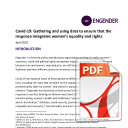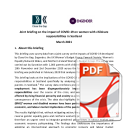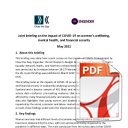Engender blog
Exploring the impact of Covid-19 on women's equality in Scotland

Over the past eighteen months, we’ve seen how the inequalities that existed before Covid-19 have been magnified and intensified by the pandemic. Covid-19 has disproportionately impacted women both at work and at home, with UN Women estimating that the impact for women’s equality could mean a rollback of 25 years of progress on women’s rights.
Women in Scotland face a reduction in paid work both due to increased caring responsibilities and being concentrated in industries hardest hit by the pandemic like hospitality and nursing, which also places women at increased risk of exposure to Covid-19. There is a widening gender gap in unpaid work as women are expected to pick up the slack created by widespread reduction in social care packages, made even more difficult by the persistent inadequacy of social security provision, which has been further compounded by the recent £20 cut in Universal Credit.
Throughout the past year, we’ve joined with organisations across the 4 nations of the UK including Close the Gap, the UK Women’s Budget Group, the Fawcett Society, Women’s Equality Network Wales and the Northern Ireland Women’s Budget Group in a polling project to collect survey data on the impact of Covid-19 on women, funded by the Standard Life Foundation and the Joseph Rowntree Reform Trust. We’ve also worked with Close the Gap to produce joint reports highlighting what this data tells us about the impact of Covid-19 on women in Scotland specifically.
Young Women
Last month we published a report exploring how young women’s employment, financial security and mental health has been affected by the pandemic. The data showed that young women, particularly young Black and minority ethnic women and those on low incomes, were less likely to have had their furloughed salary topped up by their employer than men, and are more likely to feel that they have fewer work or education opportunities as a result of Covid-19. Young women are more likely to report barriers to accessing training, development and employability opportunities than their male counterparts, and also more likely than young men to say their financial situation has worsened, and are more concerned about their financial security in the longer-term.
Young women are more likely to report negative mental health impacts as a result of the pandemic than young men, and are less likely to feel that they will have access to adequate support for their mental health. In addition, young women were more likely to report that their physical health had worsened during the pandemic than their male counterparts. Over a third of young women are less optimistic about the future, compared with a quarter of young men, with particular concerns around employment and access to childcare. The research also found that among young people there are high levels of support for policies that could advance women’s economic and social equality, including in terms of the labour market, financial security, and health and wellbeing. You can read this joint report with Close the Gap online here.
Mental health and wellbeing
During Mental Health Awareness week in May, we published a joint briefing on the impact of Covid-19 on women’s wellbeing, mental health, and financial security, which you can read online here. As above, women and in particular young women, were more likely to be reporting negative mental health impacts as a result of the pandemic. Women - particularly disabled women and young women - are more likely than men to have sought support for or increased the support they are receiving for their mental health over the course of the pandemic.
Looking at key measures of wellbeing including diet, nutrition and level of exercise, women were more likely to report that their experience of these had declined throughout the ongoing crisis. Women, again particularly young and disabled women, were significantly more likely than men to report increased financial precarity as a result of Covid-19, and women were more likely than men to be receiving less support from their employer since the first lockdown.
Childcare
In March, we published a joint briefing on the impact of Covid-19 on women with childcare responsibilities which highlighted how the closure of schools and nurseries during the first lockdown disproportionately impacted women’s employment. Our Gender & Unpaid Work research in 2020 showed that the incompatibility of paid work, home-schooling and childcare saw mothers withdraw from paid work at a cost of £15m a day in Scotland. The survey data showed that women with childcare responsibilities are experiencing higher levels of anxiety during the ongoing crisis, particularly Black and minority ethnic and disabled women.
Women’s propensity to work part-time places them at greater risk of job disruption, and Black and minority ethnic and disabled women were significantly more likely to say they were unfairly selected for furloughed compared with their white and non-disabled counterparts. As a result of the Covid-19 pandemic, Black and minority ethnic and disabled women are experiencing further and deeper poverty, with disabled women more likely to report struggling to make ends meet than non-disabled women, and Black and minority ethnic women more likely to lose working hours. You can read our joint briefing with Close the Gap online here.
As well as briefings looking at the situation for women in Scotland, you can also find briefings published as part of the 4 nations polling project on how women are less likely than men to feel that the Government’s response to Covid-19 has met their needs online here, the uneven impact of lockdown on mothers and low-income parents online here, the impact of the pandemic on disabled parents online here, the impact of Covid-19 on young women on low incomes online here, and the post-pandemic aspirations of young people online here.
Covid-19 continues to affect women’s social and economic wellbeing, as we see women’s unpaid and undervalued work continue, economic hardship hitting women-dominated sectors, and the very real threat of the virus continue to curtail the lives of the most vulnerable.
Share this post on …
Comments: 0 (Add)
Downloads
 Covid-19: Gathering and using data to ensure that the response integrates women’s equality and rights
Covid-19 demands an emergency response.
Covid-19: Gathering and using data to ensure that the response integrates women’s equality and rights
Covid-19 demands an emergency response.
 Engender and Close the Gap Joint briefing on the impact of COVID-19 on women with childcare responsibilities in Scotland
This briefing looks at the implications of the COVID-19 crisis on women with childcare responsibilities in Scotland specifically by analysing survey data gathered from 721 parents in Scotland.
Engender and Close the Gap Joint briefing on the impact of COVID-19 on women with childcare responsibilities in Scotland
This briefing looks at the implications of the COVID-19 crisis on women with childcare responsibilities in Scotland specifically by analysing survey data gathered from 721 parents in Scotland.
 Engender and Close the Gap Joint Briefing on the impact of COVID-19 on women's wellbeing, mental health and financial security
This briefing looks at the impacts of COVID-19 on women’s wellbeing, mental health, and financial security in Scotland by analysing survey data gathered from 509 adults in Scotland and a booster sample of 401 Black and minority ethnic (BME) adults.
Engender and Close the Gap Joint Briefing on the impact of COVID-19 on women's wellbeing, mental health and financial security
This briefing looks at the impacts of COVID-19 on women’s wellbeing, mental health, and financial security in Scotland by analysing survey data gathered from 509 adults in Scotland and a booster sample of 401 Black and minority ethnic (BME) adults.

Newsletter
Sign up to receive our newsletter here:
Sign up to our mailing list
Receive key feminist updates direct to your inbox: